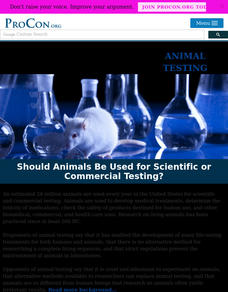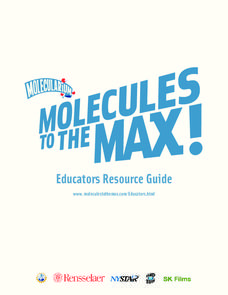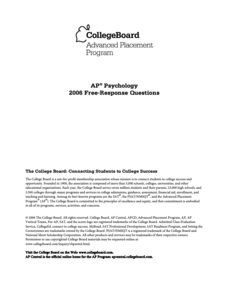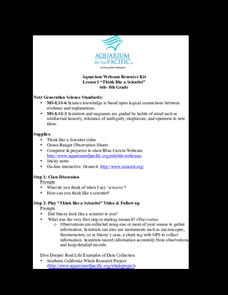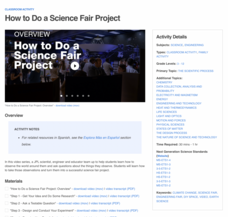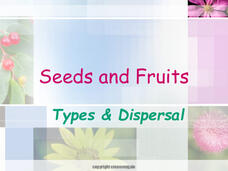Utah Education Network (UEN)
Microwave Magic
The microwave is a staple in many American households, but how exactly does it work? Approach this question from a scientific and practical standpoint, and discover cooking strategies, recipes, and methodologies for the standard microwave.
WE Charity
High School–Module 3: Food Waste
Advances in packaging and refrigeration help keep food fresher longer. That's just one of the ways science is addressing global food waste. With the third of five lessons from the WE Are Innovators—High School Modules set, scholars use...
Curated OER
Animal Testing
Animal testing: cruel and inhumane, or innovative and life-saving? Scholars explore the topic and form their own opinions with help from the highly informative website. Pupils read a comprehensive overview of the topic, including...
Chicago Botanic Garden
Historical Climate Cycles
What better way to make predictions about future weather and climate patterns than with actual climate data from the past? Young climatologists analyze data from 400,000 to 10,000 years ago to determine if climate has changed over time....
Compassion in World Farming Trust
Selective Breeding of Farm Animals
Biology learners read about selective breeding in chickens and how it has produced high-yield meat specimens and rapid egg-layers. The unpleasant effects of artificial selection are explored, as well as options to supporting this...
Kenan Fellows
Microorganisms in Pond Water
That is living in the water? Groups of two to three view pond water with microscopes in order to find microorganisms. They draw pictures of the ones they find in their slides. The groups compare their drawings to pictures of common pond...
Rensselaer Polytechnic Institute
Molecules to the Max!—Educators Resource Guide
From molecules to nanotubes, an engaging unit explores the world of tiny science. Fifteen hands-on experiments and lessons engage young scientists as they learn chemistry. Discussions, worksheets, and data analysis reinforce the concepts...
NASA
Cleaning Water
Give young scientists a new appreciation of fresh, clean drinking water. After learning about the ways astronauts recycle their air and water, your class will work in small groups creating and testing their very own water filtration...
Wilderness Classroom
Pollution
Educate scholars on pollution—air, water, and land—with a series of lessons that begin with a thorough explanation of each type. Learners then take part in three activities to reinforce the importance of reducing pollution. They...
Benjamin Franklin Tercentenary
Let’s Throw an Electric Science Party!
Are you looking for a shockingly good instructional activity? Check out one that has middle schoolers recreate four of Benjamin Franklin's experiments. Groups investigate, observe, and draw conclusions about static electricity and...
Howard Hughes Medical Institute
Testing a Hypothesis
Are sickle cell disease and malaria related somehow? Scholars learn about both illnesses and the hypotheses that they are related. They discuss, view a video, and answer questions to demonstrate understanding. The resource includes an...
College Board
2006 AP® Psychology Free-Response Questions
A person wants to buy a car but is having a hard time making a decision. What is getting in the way? Learners turn to psychology to explain what is driving the ambivalence using materials from College Board. A second query asks scholars...
Aquarium of the Pacific
Think Like a Scientist
Scholars watch a video and meet a scientist who is studying sharks as she explains her observations about the sharks and provides her hypothesis to explain their behavior. Learners then act like a scientist as they watch an aquarium...
NASA
How to Do a Science Fair Project
Build problem-solving skills with science! Step-by-step videos walk investigators through each stage of completing a science fair project. Scientists learn to formulate a testable question, design an experiment, collect data, draw...
Curated OER
Designing a Crew Exploration Vehicle
Take your class on an out-of-this-world adventure with this fun engineering design activity. Working in small groups, young scientists design, build, and test crew exploration vehicles using some creativity, teamwork, and an assortment...
Michigan State University
Gases Matter
Young scientists learn that seeing isn't necessarily believing when it comes to the states of matter. After performing a fun class demonstration that models the difference between solids, liquids, and gases, children complete a series of...
Science Matters
Spaghetti Fault Model
Does increasing the pressure between two moving plates provide a stabilizing force or create more destruction? The hands-on lesson encourages exploration of strike-split fault models. The sixth lesson in a 20-part series asks scholars to...
Biology Junction
Seeds and Fruits: Types and Dispersal
Did you know that some seeds rely on elephant dung for dispersal? Pupils use class discussion and direct instruction based around a presentation to learn about seed types and dispersal methods. Slides vary from presenting content to...
Smarter Balanced
Classifying Vertebrates
What features do scientists use to classify animals into groups? Class groups examine a series of paired images of vertebrates (a bass and a trout, a toad and a newt, a crocodile and a tortoise, an owl and a robin, a tiger and a bear)...
American Psychological Association
Research Ethics
Psychologists designing experiments to research human behavior must consider weighty ethical concerns. Class members act as members of an institutional review board and examine proposals to determine whether included provisions...
Rice University
Intermediate Algebra
Algebra concepts are all wrapped up in one nice bow. The resource combines all the concepts typically found in Algebra I and Algebra II courses in one eBook. The topics covered begin with solving linear equations and move to linear...
NOAA
Invertebrates
Crabs and lobsters ... yum! The 18th installment of a 23-part NOAA Enrichment in Marine sciences and Oceanography (NEMO) program focuses on invertebrate marine life. After the lecture slideshow, learners conduct an activity to sample...
Teach Engineering
Viscous Fluids
Elasticity and viscosity. Help your class understand the similarities and differences with an introduction to viscous fluids. After describing four types of fluid behaviors: shear thinning, shear thickening, Bringham plastic, and...
Institute of Electrical and Electronics Engineers
Chair Lift Challenge
During the Winter Olympics, this would be an engaging task to include in your STEM lesson. Design teams plan, construct, and test a miniature ski lift that can carry a pingpong ball up and down a rope line without falling out. With this...
Other popular searches
- Scientific Method Worksheet
- Scientific Method Activities
- Scientific Method Variables
- The Scientific Method
- Scientific Method Hypothesis
- Six Step Scientific Method
- Scientific Method Lab
- Scientific Method Powerpoint
- Basic Scientific Method
- Scientific Method Botany
- Scientific Method Lab Report
- Scientific Method Vocabulary




